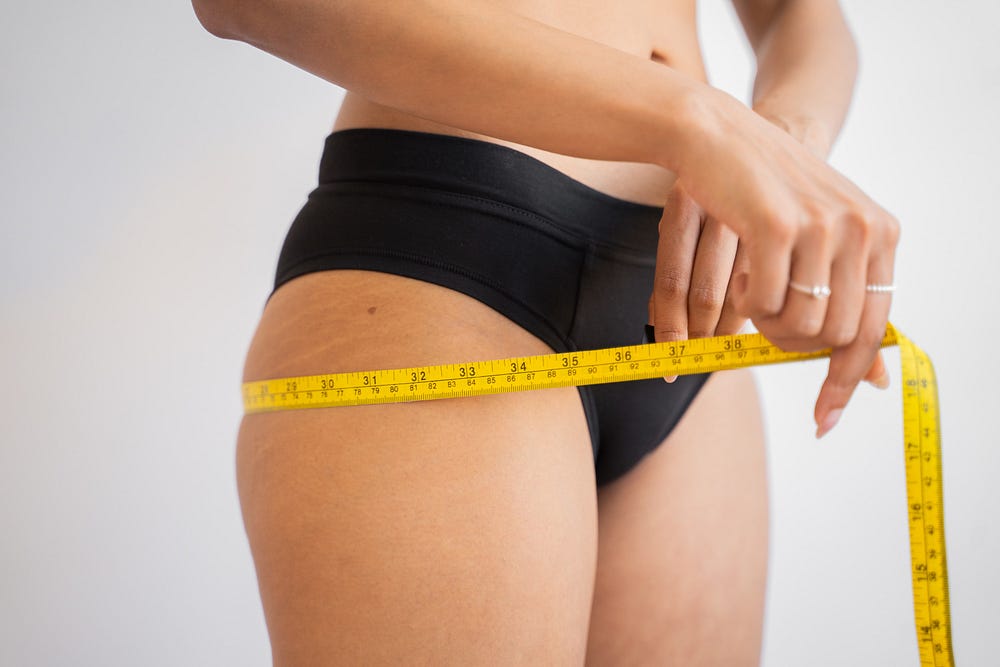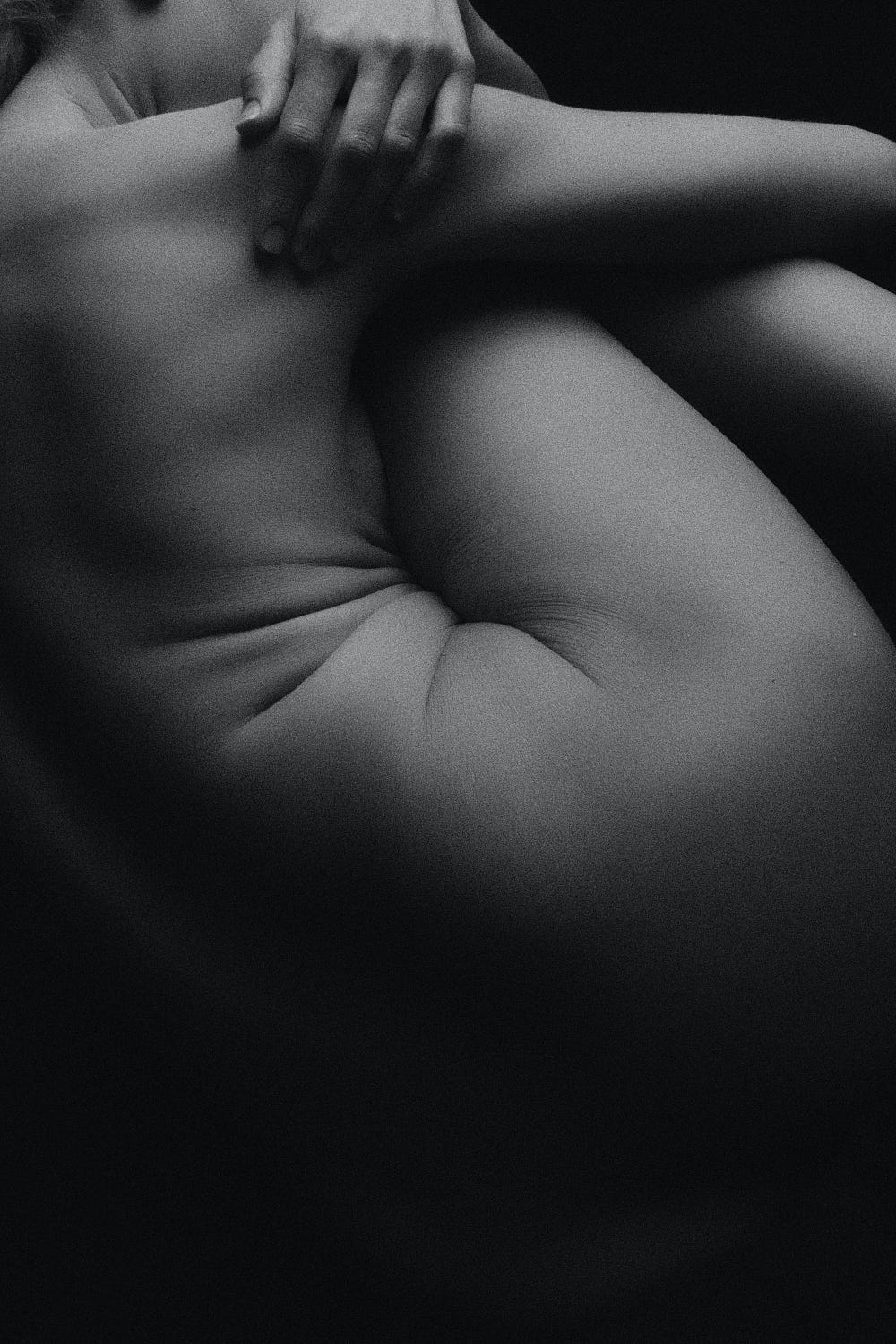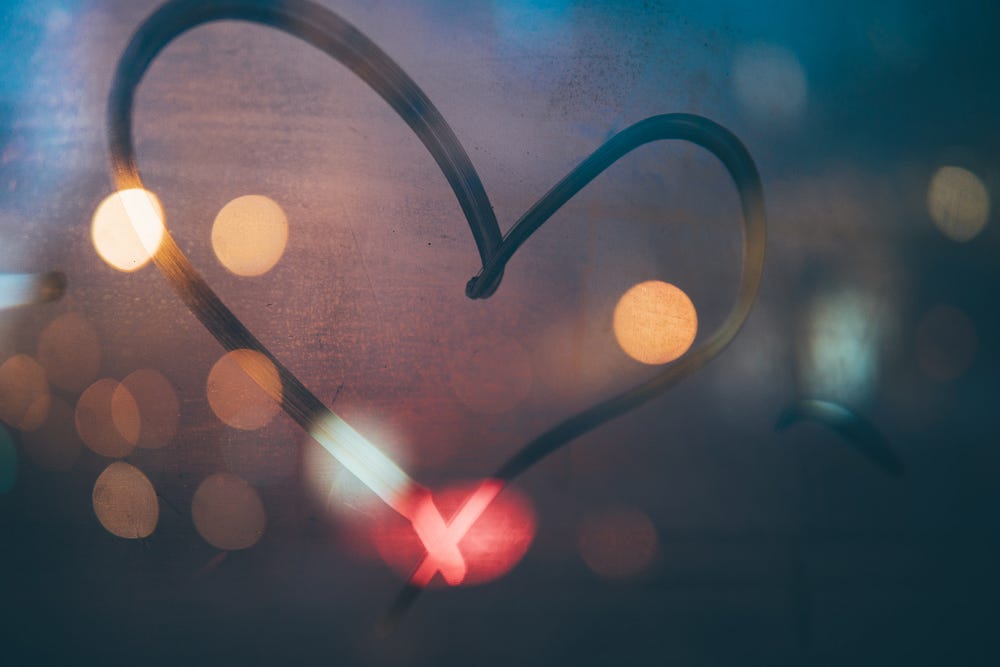When we refuse to take medication that we’re prescribed because one of the side effects is ‘weight gain’, coming underneath ‘reduced life expectancy’ in our heads as something to worry about, the prospect of becoming ‘fat’ more terrifying to us than the prospect of dying, we know that something has gone seriously wrong in our society…

We need to confront our societally bred fear of fatness.
Because of the society in which we live, whereby internalised fatphobia (& externalised!) is rampant, there are so many morals tied to weight, both to the weight of ourselves, and to the weight of others, with this being something that can lead us to engage in disordered eating*.
*(Even if you’re not actively engaging in disordered eating behaviours, if you’ve ever referred to food as ‘good’ or ‘bad’, if you’ve ever said ‘oh, I shouldn’t’ when offered a piece of chocolate, then you can’t say that you have a fully healthy relationship with food)…
Fuelled by a society which values thinness above all else, seeing slim bodies as the only desirable body type, we attach (wholly incorrect) assumptions that to be ‘plus size’ is to be ‘greedy’, ‘lazy’, and/or ‘lacking discipline’ (all of which are, again, wholly incorrect assumptions). In fact, I would argue that it actually takes more discipline to go against what society is telling us we should be doing, how society is telling us we should look (thin), than it takes to blindly conform…
What someone weighs is not synonymous with how healthy they are.
Seeing someone in a slim body, side-by-side with someone in a larger body, people, if asked, would most likely point to the slimmer body as being the ‘healthier’ body type, even if the person in the smaller body has spent their whole life battling an eating disorder. Why? Because, thinness is what we have been conditioned to believe is the epitome of health, whereas people who are bigger are looked at and perceived as being ‘unhealthy.’ While this might be true in some cases, being bigger in and of itself does not automatically equate to unhealthiness, just as being slimmer in and of itself does not automatically equate to healthiness.
‘Your healthy weight is the weight your body settles at when you’re no longer engaging in disordered eating.’
If you have to restrict what you eat in order to maintain a certain body type, if you spend more time obsessively worrying about what you have or haven’t eaten than you do actually living your life, if you’re more terrified of gaining weight than you are of dying, then you’re not healthy, no matter what the number on the scales says, for true health is defined, in equal parts based on, not just our physical health, but our mental health, too…
What makes the fat on our chest or on our bum ‘right’, but the fat on our stomach or on our thighs, ‘wrong?’
When having big boobs and/or a big bum warrants wolf whistles and shouts along the lines of ‘you’re so hot’ from random men on the street, but having fat on our stomach and/or our thighs warrants looks of disgust and ‘you’re so fat’ (intended, not as an observation, but as an insult), we can see just how tied up our perception of beauty is in misogyny… A cultural issue, unrealistic beauty standards rooted in the notion upheld by patriarchy that women are there to look ‘good’ for men.
The fact is though that…
- We do not exist to satisfy the male gaze (or any gaze at all, for that matter).
- Our bodies are not objects, so don’t objectify them.
- Our bodies are not your ‘playthings’, so don’t sexualise them.
- WOMEN DON’T OWE YOU PRETTY.
‘Women don’t owe you pretty’
Thin or fat, body hair or no body hair, makeup or no makeup, it doesn’t matter. I’m not saying that we should start completely disregarding our appearance, vowing to never look in the mirror ever again, but we should start to credit who we are as being more, far more, about who we are on the inside, as opposed to how we look on the outside…
Don’t get me wrong, I love wearing cool clothes that make me feel good as much as the next person, but, this is the key point here- ‘clothes that make me feel good.’ We need to get to a place where we present ourselves in a way that we want to present ourselves because we like it, not because we feel as though we’re expected to present ourselves in a certain way to please others.
The role of social media on body image
Having, for decades, been considered the worst insult you could give to a woman, ‘fat’, much like ‘queer’, is a word that has been reclaimed by those who were once made to feel oppressed by it, as a source of self-empowerment, almost. With body positive influencers on Instagram proudly declaring themselves to be ‘fat’ in their bio’s, it is proving to be losing value as a derogatory term, as it should. ‘Thin’ isn’t used as an insult, so why is ‘fat?’ Why are we using body types to shame people?
Hopefully then, with the rise in body positive influencers on social media, we will see the trajectory of body positivity going up and up, the concept of embracing who we are becoming less ‘radical’ and more of a ‘given’, until we get to a stage where fatphobia is a ‘thing of the past.’ Where we can all just get on with our lives with appreciation for what our bodies do for us, keeping us alive, no less, as opposed to constantly obsessing over how our bodies look…
If you’re following people online who heavily edit their photos, promoting an unrealistic body image, or people who have to work really hard to maintain a certain body type that is most definitely NOT ‘natural’, nor healthy for them, then you’re likely to feel more dysphoric in your own body, for, based on the people you follow, your body is ‘wrong’, because it doesn’t match theirs…
If, however, you follow a diverse range of people, curating your feed in such a way that you’re regularly seeing people of all different body types, able bodies and disabled bodies, thin bodies and fat bodies, shaved bodies and unshaven bodies, the representation is likely to help you to feel seen and more accepting of your own body. Because, the fact is that most people in the general population will not have a thigh gap. Most people will not have totally flat stomachs or toned abs. Most bodies will look like bodies- beautiful and messy, a reflection of the life which they carry…
My experience

When I was 15, I developed Anorexia (which you can read more about here), and 7 years on, now aged 22, I’m the heaviest I’ve ever been, but, I’m also the happiest. I do sometimes think that people who knew me when I was at my lowest, when my identity was ‘Lisa the runner’ (and Anorexic but, we’ll overlook that because ‘she can run fast’), will look at me now and have the rhetoric of me having ‘let myself go’, at the forefront of their mind, but, as the worry creeps in of, ‘what will people be thinking?’, I remind myself that, yes, I have ‘let go’, but not of myself, of the very thing that was killing me;
- I’ve let go of the need to control every aspect of my life.
- I’ve let go of everything I thought represented beauty and being ‘good.’
- I’ve let go of the identity Anorexia had made for me, a life revolving around food and exercise, and I’ve found my true identity.
- I’ve let go, not of myself, but of all the things that stopped me from finding myself, and now I am free.

Now I am free to look at my body, not with disgust or disdain as I used to, but with marvel and wonder and gratitude, filled with appreciation for all that it does for me;
- When I come on my period, the flowing blood a signifier of my bodies ability to create life, an actual human being.
- When I go hiking, climbing up mountains, my thighs that I used to hate powering me up.
- When I sit and allow myself to rest and feel contentment and not obsessive worry that I am ‘lazy’, having not done enough exercise and/or eaten too much of the ‘wrong’ thing.
- When I acknowledge that my body keeps me alive, no less
every.
single.
day.
When I do all of these ( ^ ) things, I thank god that I chose recovery over relapse,
living over dying,
love over hate,
tomorrow over yesterday…
Finding who I am
Now I don’t restrict my food intake, I don’t overexercise, I don’t punish myself for needing what every human needs to survive- food. I allow myself to eat whatever I want to eat, and I exercise when I feel like it.
And so, with the headspace to think about more than just calories and macros and weight and miles, I am free to think about, and do the things, that light me up inside:
Writing
and reading
and poetry
and social justice
and politics
and activism
and…
LIFE.
Because, now I actually have a life that I want to live, not a life that sees me waking up being filled with a sense of dread, but a life that sees me waking up filled with inspiration and motivation for all the things that I want to write and do and create.
Life is beautiful, and our ability to experience that beauty rests in our choice to let go of arbitrary beauty standards of what constitutes the ‘right’ body.
How did I change my mindset?
Fatphobia is so deeply ingrained in our culture, being passed from generation to generation, that it is hard to overcome, but, it can be done (by remembering two things)…

1) Our bodies are so unimportant in the grand scheme of things; My body couldn’t possibly sum up who I am.
When we refer to people as being ‘in’ a bigger or a smaller body, we use the word ‘in’ for a reason… The reason being because we, who we really are, the true nature of our being, is inside of our body, not our body itself. Surely then, being of such insignificance, there’s something of more weight than our bodies (pardon the pun) that can be discussed?
Tell me what you’re passionate about, talk to me about the causes that are closest to your heart, tell me what you believe in, all the things that actually matter. For, when you get to the end of your life and your family are standing around your bedside, no one is going to look back fondly at how you so diligently managed to abstain from eating so as to maintain your figure, or smile as they remember how many miles you would run on an empty stomach each morning before breakfast, because, although it feels like the most important thing in the world when you’re in that mindset, these things are so unimportant.
What people will remember about you are all the things that have absolutely no association to what you look like at all;
Your kindness
and your selflessness
and the number of lives you enhanced with your presence
(not the number that showed up when you stood on the scales)…
People will remember you, not your body because, again, the two are not one and the same. Our body is the vessel for which we exist within. Like a parcel, the contents- what is important- is on the inside.

2) People who do judge others based on what they weigh are not people I want in my life, and therefore their opinion doesn’t matter to me
Ask yourself if you really want people who are fatphobic in your life.
Do you want people who are so small minded as to see what someone looks like as who they are? As a signifier of their morals? I, for one, do not. For, if someone can say something so hateful towards someone whom they don’t even know because of their weight, then what are they saying about me when I’m not there?…
I do believe that most people who are fatphobic are dealing with their own insecurities, ‘hurt people hurt people’ and all that, but, this still shouldn’t be an excuse. People who choose to stay ignorant, (because, it is a choice!), in the face of overwhelming evidence that weight is so unimportant, are not the type of people I want in my life.
I want to surround myself with people who make me see the good in life, people who restore my faith in humanity.
I want change.
How can you get to this place?
If you want things to change, then be the change you want to see in the world.
Be the person your younger self needed.
Be proof to all the people who are in the dark, that there is light, and that it doesn’t even have to be ‘at the end of the tunnel’, that it’s right there waiting for you, right now, if only you let it in.

So, let it in
– the light ❤




Leave a Reply